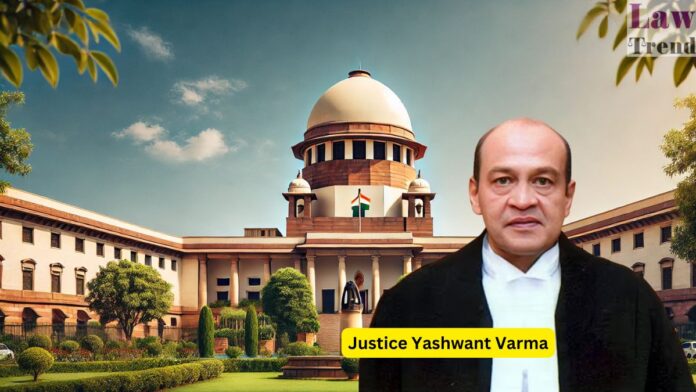Justice Yashwant Varma, embroiled in controversy since charred currency notes were found at his official residence in Delhi this March, has filed a writ petition in the Supreme Court challenging the in-house inquiry report and the subsequent recommendation for his impeachment.
In his petition, Justice Varma seeks to nullify the May 8 recommendation made by then Chief Justice of India (CJI) Sanjiv Khanna, which urged Parliament to initiate impeachment proceedings against him. He contends the report of the three-judge inquiry panel was “unsustainable” and claims the process trampled on his rights as a constitutional office-holder and as an individual.
The timing of the petition is significant, coming just ahead of Parliament’s monsoon session starting next week, when the government plans to begin the impeachment process.
Allegations of Unfair Process
Justice Varma’s petition alleges that the inquiry committee — comprising Justice Sheel Nagu (then Chief Justice of Punjab & Haryana High Court), Justice GS Sandhawalia (then Chief Justice of Himachal Pradesh High Court), and Justice Anu Sivaraman (Judge, Karnataka High Court) — reached adverse conclusions without giving him a full and fair hearing.
He argues that while some cash was indeed found in the outhouse of his residence, key aspects like ownership and authenticity were never properly investigated. Instead, he claims, the committee rushed the proceedings, reversed the burden of proof, and followed an “outcome-driven” approach based on a preconceived narrative.
According to sources, Justice Varma asserts that the inquiry timelines prioritized speed over fairness, leaving him little chance to defend himself effectively.
Background of the Controversy
The case began on March 14 when a fire broke out at the outhouse of Justice Varma’s Delhi residence. Firefighters reportedly discovered charred currency stuffed in sacks. The then Chief Justice of Delhi High Court alerted the CJI, leading to the formation of the inquiry panel on March 22.
The panel’s 64-page report, submitted on May 3, concluded that although no direct evidence linked Justice Varma to the cash, there was “strong inferential evidence” of his “covert or active control.” It held that his conduct betrayed the public trust inherent in a constitutional office and amounted to serious judicial misconduct.
In its words, “The very existence of judicial office is founded upon the trust of the citizens. Any deficiency in this regard erodes public trust.” The report noted that once the presence of burnt cash was established, the burden shifted to Justice Varma to provide a plausible explanation — something he failed to do beyond a flat denial and claims of conspiracy.
Following the report, Justice Varma was relieved of judicial work and transferred back to his parent High Court in Allahabad.
Political and Legal Fallout
As first reported in June, Justice Varma rejected the advice from then CJI Khanna to resign or take voluntary retirement, calling the process “fundamentally unjust.” In a letter dated May 6, he pointed out alleged violations of natural justice and urged a relook at both the findings and the process.
The controversy has drawn political attention as well. Parliamentary affairs minister Kiren Rijiju recently confirmed that the Union government has approached Opposition parties to secure support for the impeachment motion, expected to be introduced by law minister Arjun Ram Meghwal during the monsoon session.
Adding to the debate, Vice President and Rajya Sabha chairman Jagdeep Dhankhar, at a public event on May 19, questioned the constitutional validity of the in-house inquiry mechanism and suggested that a formal criminal investigation might have been a more appropriate course.
Opposition’s Parallel Push
Meanwhile, a section of the Opposition’s INDIA bloc is preparing to revive its impeachment push against Allahabad High Court judge Justice Shekhar Kumar Yadav over a controversial speech delivered at a Vishwa Hindu Parishad event.
In December 2024, 55 Opposition MPs, including Kapil Sibal, Jairam Ramesh, and Saket Gokhale, submitted an impeachment notice against Justice Yadav. Although the Supreme Court considered an in-house inquiry, it was reportedly dropped following communication from the Rajya Sabha secretariat citing exclusive jurisdiction.
Opposition leaders have since criticized what they see as the government’s selective action — moving quickly on Justice Varma while appearing inactive on Justice Yadav.




